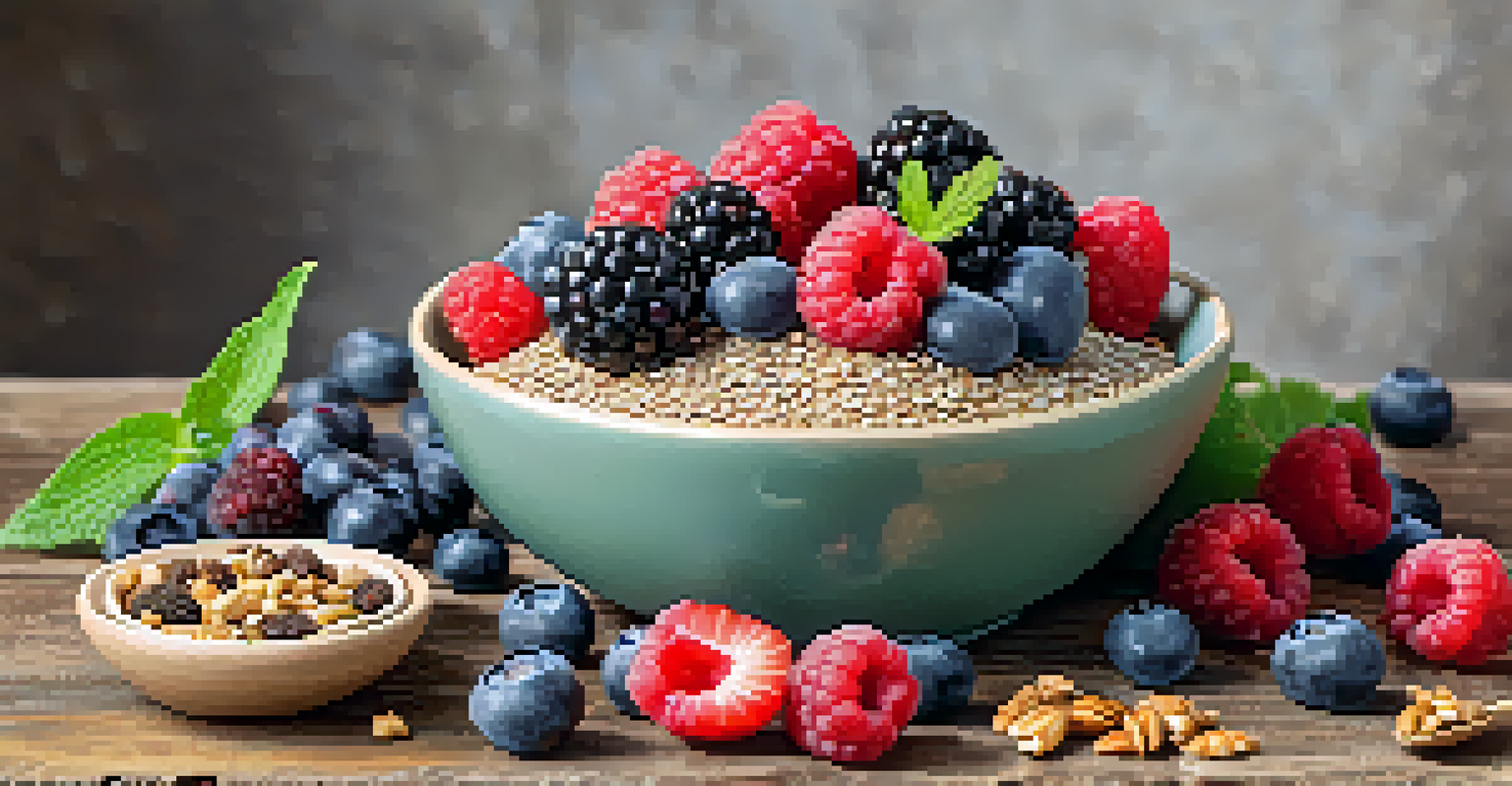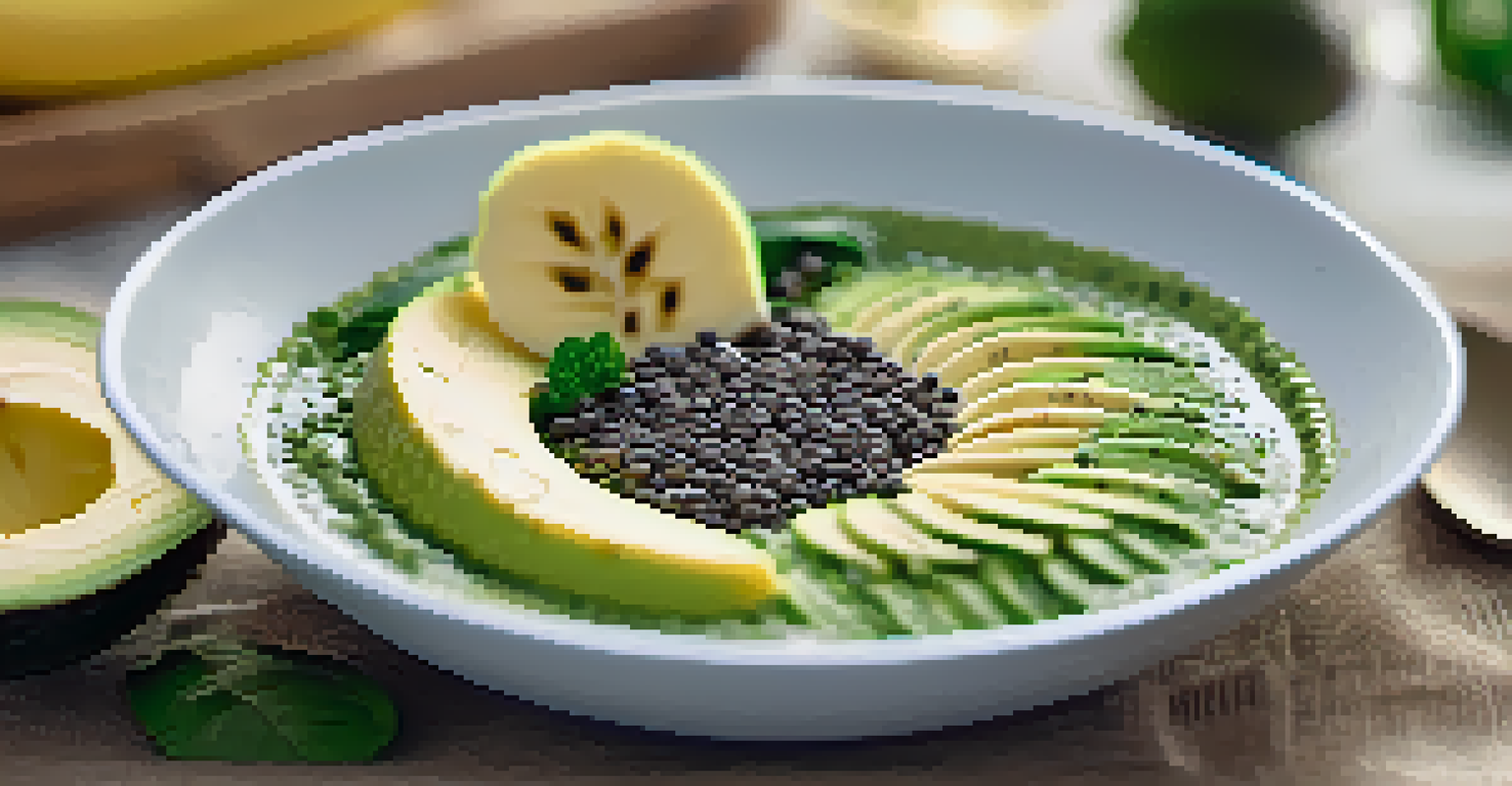Plant-Based Diets and Omega-3 Fatty Acids Explained

What is a Plant-Based Diet and Why Choose It?
A plant-based diet primarily focuses on foods derived from plants, including fruits, vegetables, nuts, seeds, oils, whole grains, legumes, and beans. It's not just about being vegetarian or vegan; it emphasizes the consumption of whole, minimally processed foods. Many people choose this diet for health benefits, environmental concerns, or ethical reasons surrounding animal welfare.
Let food be thy medicine and medicine be thy food.
Research suggests that adopting a plant-based diet can lead to numerous health benefits, such as lower cholesterol levels, reduced risk of chronic diseases, and improved weight management. By incorporating a variety of plant foods, you can enjoy a nutrient-rich diet that supports overall well-being. Plus, the diversity of flavors and textures in plant-based meals can be a delightful culinary adventure.
However, transitioning to a plant-based diet may seem daunting for some. It’s essential to approach it gradually, experimenting with new recipes and ingredients to find what you enjoy. With a little patience and creativity, you can make this lifestyle change a fulfilling and enjoyable experience.
The Importance of Omega-3 Fatty Acids
Omega-3 fatty acids are essential fats our bodies need but cannot produce on their own. They play a crucial role in brain function, heart health, and reducing inflammation. There are three primary types of omega-3s: ALA (alpha-linolenic acid), EPA (eicosapentaenoic acid), and DHA (docosahexaenoic acid), found in various foods and supplements.

Many people associate omega-3s with fish, but they can also be obtained from plant sources. ALA is the most common form found in plant-based foods, including flaxseeds, chia seeds, walnuts, and hemp seeds. Including these foods in your diet can help ensure you’re getting enough omega-3s while supporting a plant-based lifestyle.
Benefits of a Plant-Based Diet
A plant-based diet offers numerous health benefits, including lower cholesterol and reduced risk of chronic diseases.
It's important to note that while ALA can convert to EPA and DHA in the body, the conversion rate is quite low. Therefore, those following a plant-based diet might need to be more intentional about their omega-3 intake, possibly considering supplements derived from algae that provide EPA and DHA directly.
Plant-Based Sources of Omega-3 Fatty Acids
When looking to increase your omega-3 intake on a plant-based diet, flaxseeds are a powerhouse option. Just two tablespoons of ground flaxseeds provide about 3,000 mg of ALA, making them an easy addition to smoothies or oatmeal. Chia seeds, another excellent source, are versatile and can be used in puddings, baked goods, or sprinkled on salads.
The food you eat can either be the safest and most powerful form of medicine or the slowest form of poison.
Walnuts are another great source of omega-3s, offering approximately 2,500 mg of ALA per ounce. They can be enjoyed as a snack, added to trail mixes, or incorporated into various dishes for added crunch and flavor. Additionally, hemp seeds are a nutritious option, providing a balanced ratio of omega-3 and omega-6 fatty acids.
For those seeking alternative sources, algae-based supplements are becoming increasingly popular. These supplements can provide both EPA and DHA, filling the gap for individuals who may struggle to get enough omega-3s through plant-based foods alone. Just remember to choose high-quality supplements to ensure maximum benefits.
Balancing Omega-3 and Omega-6 Fatty Acids
In addition to increasing omega-3 intake, it's essential to consider the balance between omega-3 and omega-6 fatty acids in your diet. Omega-6 fatty acids are generally more abundant in the typical Western diet, primarily sourced from vegetable oils and processed foods. While they are essential for health, excessive omega-6 can lead to inflammation and other health issues.
Striving for a balanced ratio of omega-3 to omega-6 fatty acids can promote better overall health. Ideally, aim for a ratio closer to 1:1 or 1:4, although the average Western diet can sometimes be as high as 1:20. By focusing on whole, minimally processed foods and incorporating more omega-3 sources, you can help achieve this balance.
Sources of Omega-3 for Plants
Plant-based foods such as flaxseeds, chia seeds, and walnuts are excellent sources of omega-3 fatty acids.
One effective way to reduce omega-6 intake is to limit processed foods and replace cooking oils high in omega-6 with healthier options like olive oil or avocado oil. This simple change can have a positive impact on your overall fatty acid balance and enhance the benefits of a plant-based diet.
Common Myths About Omega-3s and Plant-Based Diets
There are several myths surrounding omega-3 fatty acids and plant-based diets that can lead to confusion. One common misconception is that plant-based diets cannot provide adequate omega-3s. However, as mentioned earlier, there are plenty of plant sources rich in ALA, and with mindful eating, you can meet your omega-3 needs.
Another myth is that you must consume fish to get EPA and DHA. While fish are a source of these fatty acids, plant-based options like algae supplements can effectively provide them without the need for fish. This is particularly beneficial for those who follow a strict plant-based lifestyle or have ethical concerns about consuming animal products.
Lastly, some people believe that all omega-3 sources are created equal. It’s crucial to understand that ALA, EPA, and DHA serve different functions in the body. Therefore, a well-rounded approach that includes a variety of omega-3 sources can help you achieve optimal health benefits.
Tips for Incorporating Omega-3s into Your Diet
Incorporating omega-3-rich foods into your plant-based diet can be both easy and enjoyable. Start by adding ground flaxseeds or chia seeds to your morning smoothie or yogurt. This not only boosts your omega-3 intake but also adds fiber and nutrients, making your breakfast even healthier.
Consider swapping out traditional cooking oils for those higher in omega-3s, such as flaxseed oil or hemp oil, when preparing dressings or drizzling over dishes. This small change can enhance your meals with healthy fats without altering the flavor significantly. Additionally, try snacking on a handful of walnuts instead of chips or crackers for a satisfying and nutritious alternative.
Consult Professionals for Guidance
Consulting with a healthcare professional can help ensure you meet your nutritional needs while following a plant-based diet.
Lastly, don’t hesitate to experiment with new recipes that highlight omega-3-rich ingredients. From chia pudding to walnut-based sauces, there are countless creative ways to enjoy these foods while reaping the health benefits. Remember, the key is to keep things fun and flavorful!
Consulting a Health Professional for Personalized Advice
While plant-based diets can be incredibly healthy, it's essential to ensure you're meeting all your nutritional needs, including omega-3 fatty acids. Consulting with a healthcare professional, such as a registered dietitian, can provide personalized guidance tailored to your individual dietary preferences and health goals. They can help you assess your current intake and make recommendations to optimize your nutrition.
If you're considering taking omega-3 supplements, discussing this with a healthcare provider is also a good idea. They can help you determine the right type and dosage based on your specific needs. This is especially important for individuals with certain health conditions or those who are pregnant or breastfeeding.

Remember, your health journey is unique, and it's perfectly okay to seek support along the way. By working with a professional, you can feel confident that you're making informed choices that will benefit your overall health and well-being.